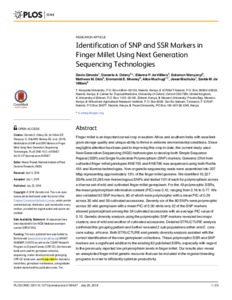Identification of SNP and SSR Markers in Finger Millet Using Next Generation Sequencing Technologies
Abstract
Finger millet is an important cereal crop in eastern Africa and southern India with excellent grain storage quality and unique ability to thrive in extreme environmental conditions. Since negligible attention has been paid to improving this crop to date, the current study used Next Generation Sequencing (NGS) technologies to develop both Simple Sequence Repeat (SSR) and Single Nucleotide Polymorphism (SNP) markers. Genomic DNA from cultivated finger millet genotypes KNE755 and KNE796 was sequenced using both Roche 454 and Illumina technologies. Non-organelle sequencing reads were assembled into 207 Mbp representing approximately 13% of the finger millet genome. We identified 10,327 SSRs and 23,285 non-homeologous SNPs and tested 101 of each for polymorphism across a diverse set of wild and cultivated finger millet germplasm. For the 49 polymorphic SSRs, the mean polymorphism information content (PIC) was 0.42, ranging from 0.16 to 0.77. We also validated 92 SNP markers, 80 of which were polymorphic with a mean PIC of 0.29 across 30 wild and 59 cultivated accessions. Seventy-six of the 80 SNPs were polymorphic across 30 wild germplasm with a mean PIC of 0.30 while only 22 of the SNP markers showed polymorphism among the 59 cultivated accessions with an average PIC value of 0.15. Genetic diversity analysis using the polymorphic SNP markers revealed two major clusters; one of wild and another of cultivated accessions. Detailed STRUCTURE analysis confirmed this grouping pattern and further revealed 2 sub-populations within wild E. coracana subsp. africana. Both STRUCTURE and genetic diversity analysis assisted with the correct identification of the new germplasm collections. These polymorphic SSR and SNP markers are a significant addition to the existing 82 published SSRs, especially with regard to the previously reported low polymorphism levels in finger millet. Our results also reveal an unexploited finger millet genetic resource that can be included in the regional breeding programs in order to efficiently optimize productivity

